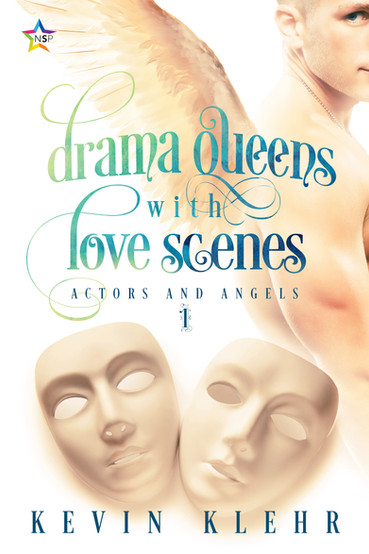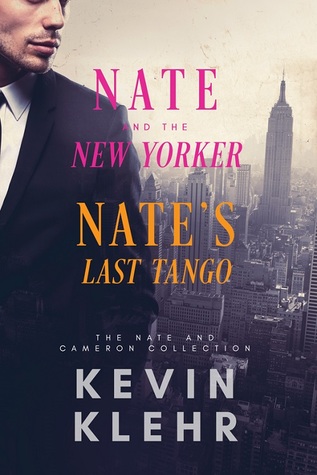10 Questions with Kevin Klehr
- Nikky Lee
- Jun 12, 2021
- 5 min read
Updated: Nov 20, 2021


Kevin lives with his husband, Warren, in their humble apartment (affectionately named Sabrina), in Australia’s own ‘Emerald City’, Sydney.
His tall tales explore unrequited love in the theatre district of the Afterlife, romance between a dreamer and a realist, and a dystopian city addicted to social media.
His first novel, Drama Queens with Love Scenes, spawned a secondary character named Guy. Many readers argue that Guy, the insecure gay angel, is the star of the Actors and Angels book series. His popularity surprised the author. The third in this series, Drama Queens and Devilish Schemes, scored a Rainbow Award (judged by fans of queer fiction) for Best Gay Alternative Universe/Reality novel.
So, with his fictional guardian angel guiding him, Kevin hopes to bring more whimsical tales of love, life and friendship to his readers.
1. Tell us a bit about yourself! Where do you call home and what do you write?
I live in Sydney with my husband, Warren, who I have been with for just over thirty years. We have an apartment named Sabrina which we’ve lived in for nearly twenty-five years. It’s very much home.
I write queer lit because most of my work has been released through a small GLBTQIA+ American publisher. That doesn’t mean I write romance or erotica – although I have written one of each.
My work includes the Actors and Angels series which features the theatre district of the Afterlife, a dystopian tale of a society totally addicted to social media and the story of a guy in an abusive relationship who escapes into a mystical world.
2. What drew you to that particular genre and/or audience?
When I had my first novel assessed, I was told to totally rework it, highlighting my own lived experience. In that manuscript there were insights into theatre life, and although it wasn’t a romance, the two leads fell in love at the end. I extended both of these aspects of the story while deleting pretty much everything else to create Drama Queens with Love Scenes (Actors and Angels Book 1).
After many rejection letters it seemed my best bet was to aim at queer specific publishers. So ever since, that’s where my books have been released. One day I hope to have a mainstream release so more people can discover my back catalogue.
I’ve found most of my readers are women and older gay men. I didn’t set out to court that particular audience, but it’s good to know who I resonate with.
3. What’s your best known work?
My best known is probably my first novel, Drama Queens with Love Scenes.
4. What inspired you to write it?
In early drafts it was called Staging Life and I was inspired with the idea of characters coming to terms with issues they hadn’t dealt with in life by revisiting those issues in the plays they performed in the Afterlife.
By the second draft that idea was chucked out. It became about unrequited love and the mystery surrounding how the two leads died.
5. Tell us about your writing process. Are you a plotter, panster or somewhere in between? How do you research?
Oh, unpacking my writing process. Let’s begin.
First, I Google images of people who represent my characters. I give each of them a catchphrase (no, they don’t say these in the books). I work out their education, who they love or loved, and who they would be sexually attracted to. This was a process I picked up from an HBO script writer in a documentary.
Next, I plot each chapter. Not in detail. Just enough so I know the bare minimum of what must happen in each chapter to drive the story forward to that chapter’s cliff hanger.
More recently, I panster a little along the way. If I feel the reader would prefer to stay with a character a bit longer, then their next starring chapter might move up while I rework the outline to keep the flow.
After the first draft, I leave it alone for several months while I go to another WIP, print that one out in a font I haven’t seen it in and read it through with a red pen in hand (or these days, pdf it and use stylus on tablet). I make notes on paragraphs that should be better written, search for overwritten or underdeveloped elements (either scenes or characters), find inconsistencies, find typos, find Yoda-isms etc.
I also add any lines or inspired plot twists that came to me while that particular manuscript was ‘resting’. We all know our best ideas come when we’re not thinking about them.
I rework that manuscript before putting it away and starting the whole editing process again on one of my other WIPs. I may have two or three at any one time, each one taking years to complete.
When a particular WIP hardly needs a change, or I’m just being nit-picky with my red pen, then its ready to submit.
6. What’s the strangest or most interesting thing you’ve researched for your writing?
My husband was surprised I researched signs of domestic abuse. I explained it was for Winter Masquerade and he was relieved.
More recently the State Library of NSW put aside all the 1990s editions of the gay newspaper, The Sydney Star Observer on microfilm for me. Even though I have fond memories of that decade, having copies of articles, ads, reviews, letters to the editor and Oxford Street social pages have really helped with my novel set in that era. So much had been forgotten. So much to remember!
7. What’s the most personal story/scene you’ve written and why?
The most personal I’ve referenced in my last answer, and as it’s a hard subject (and happened many decades ago), I might talk about my second most personal story.
The Actors and Angel series have two main characters based on me and Warren. I’ve swapped our backstories and added angst, but there are certain behavioural traits and things we regularly say to each other in those stories.
In the last book, Drama Queens and Devilish Schemes, I had to think about what would push our marriage to the edge, then rescue our relationship.
8. Who are your literary influences? In what way?
Jonathan Tropper is one of my influences. He writes comedies that usually include a difficult relationship with a parent, unrequited love, and grief.
But he also does something that my very first editor made me do. He lets dialogue speak for itself. That editor told me that if you sense someone rolling their eyes or raising their voice in the words on the page, don’t tell us they have as well.
It’s a habit I’ve dropped more recently because many authors don’t live by that rule but it’s one of those things I cross out with my red pen when I see it while I edit.
9. What books are on your bedside table right now?
I just finished Craig Silvey’s Honeybee and have started J.P. Jackson’s Summoned. I regularly switch between queer lit and mainstream.
10. Last and most important, where can we find your books/stories?
Every conceivable online bookstore.

Follow Kevin on these platforms!
Liked this interview? Sign up to Nikky's mailing list to get a free story along with monthly updates, articles and interviews delivered straight to your inbox!












Comments